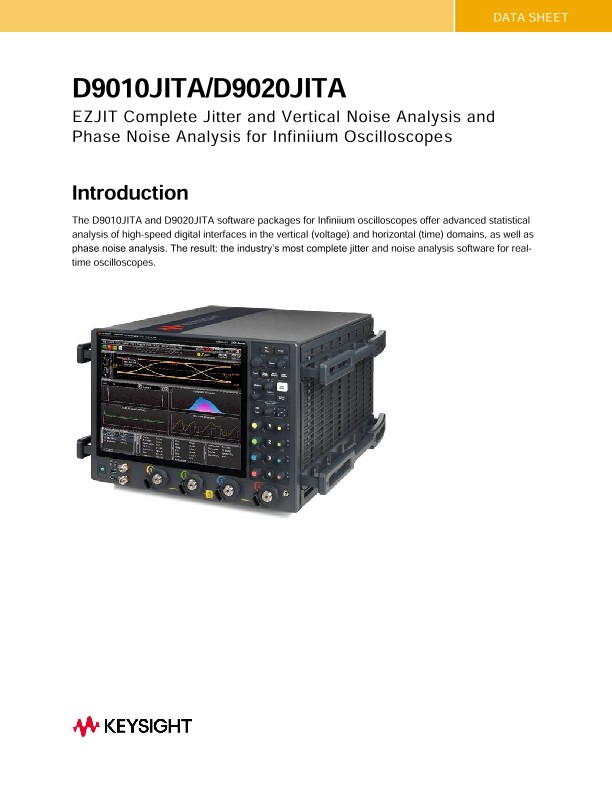
D9010JITA/D9020JITA EZJIT Complete Jitter and Vertical Noise Analysis and Phase Noise Analysis for Infiniium Oscilloscopes
Data Sheets
D9010JITA/D9020JITA
EZJIT Complete Jitter and Vertical Noise Analysis and Phase Noise Analysis for Infiniium Oscilloscopes
Introduction
The D9010JITA and D9020JITA software packages for Infiniium oscilloscopes offer advanced statistical analysis of high-speed digital interfaces in the vertical (voltage) and horizontal (time) domains, as well as phase noise analysis. The result: the industry’s most complete jitter and noise analysis software for realtime oscilloscopes.
Product Overview
With the faster edge speeds and shrinking data-valid windows in today’s high-speed digital designs, insight into the causes of signal jitter is critical for ensuring the reliability of your design. EZJIT Complete software for Infiniium oscilloscopes provides the advanced decomposition, analysis, and views of jitter necessary for fast and accurate insight into your signal. This EJZIT Complete package provides basic jitter analysis such as histograms and jitter trends, advanced level clock and data measurements such as time-interval error and UI measurements, and expert-level analysis with complete jitter separation in timing and noise in over ten categories. Finally, EZJIT Complete will allow you to make phase noise measurements on clock signals. Another large measurement benefit of EZJIT Complete is that the oscilloscope will make applicable jitter measurements on all cycles of the waveform, including those not in the display window, instead of just one cycle.
Automated Setup Wizards
Analysis Measurements and Charts
Jitter basics
Starting with the basics, EZJIT Complete lets you quickly and easily view jitter in the form of a TIE histogram, trend, and spectrum. This can be accomplished with just a few clicks in the wizard.
Timimg jitter
EZJIT Complete also provides numerous charts to determine the correct settings in your jitter separation. While the wizard provides a quick way to separate jitter, there are times when parameters need to be changed to make the correct answer. The analysis charts provide detailed information needed to properly separate the jitter of your design. EZJIT Complete includes the following jitter charts to help you in your analysis:
- Composite TJ histogram
- Composite DDJ histogram
- TJ histogram
- RJ/PJ histogram
- DDJ histogram
- Jitter BER bathtub
- RJ/PJ threshold
- DDJ vs. bit
- RJ PJ spectrum
Vertical noise
In addition to providing timing jitter separation, EZJIT Complete offers a comprehensive suite of vertical noise separation charts. These include:
- Noise BER bathtub
- Composite TI histogram
- TI histogram
- DDI histogram
- RN PI histogram
- RN PI threshold
- RN PI spectrum
- ISI vs. bit
Phase noise
Available exclusively with D90x0JITA, Keysight is the first to offer a dedicated phase noise measurement application on Infiniium oscilloscopes. Phase noise is related to clock TIE and is generally used to measure the change in an oscillator’s frequency, either in the long term or short term. When you look at the spectrum of an imperfect clock or oscillator, there will be energy radiated slightly off the nominal clock frequency (or carrier), called sidebands. Phase noise is generally measured as a ratio of the spectral power in the carrier vs. the phase noise in the sidebands, normalized to 1 Hz of bandwidth.
Phase Noise Analysis Provides
- Plotting Single Side Band (SSB) phase noise as log frequency vs dBc/Hz
- Measuring phase noise using the oscilloscope you already own
- Measuring square wave clocks
- Using 2 channels and cross-correlation to reduce broadband measurement noise.
- Measure phase noise of differential clocks with reduced broadband measurement noise.
- Measure phase noise of spread-spectrum modulated clocks (with optional SSC removal).
- Reduce broadband noise (RJ) in cross-correlated time interval error (TIE) measurements.
- Measure integrated jitter between two frequencies on phase noise plot.
- True phase/amplitude discrimination to wide offsets
- Measure phase noise in the circuit with InfiniiMax probes.
Analysis results are presented in a log frequency plot, where the amplitude units are dBc/Hz (decibels relative to the carrier power, normalized to a 1 Hz bandwidth). The x-axis is the frequency offset from the nominal signal, or “carrier” frequency. Resulting spurs can be normalized, omitted, or represented separately to better show their energy levels.